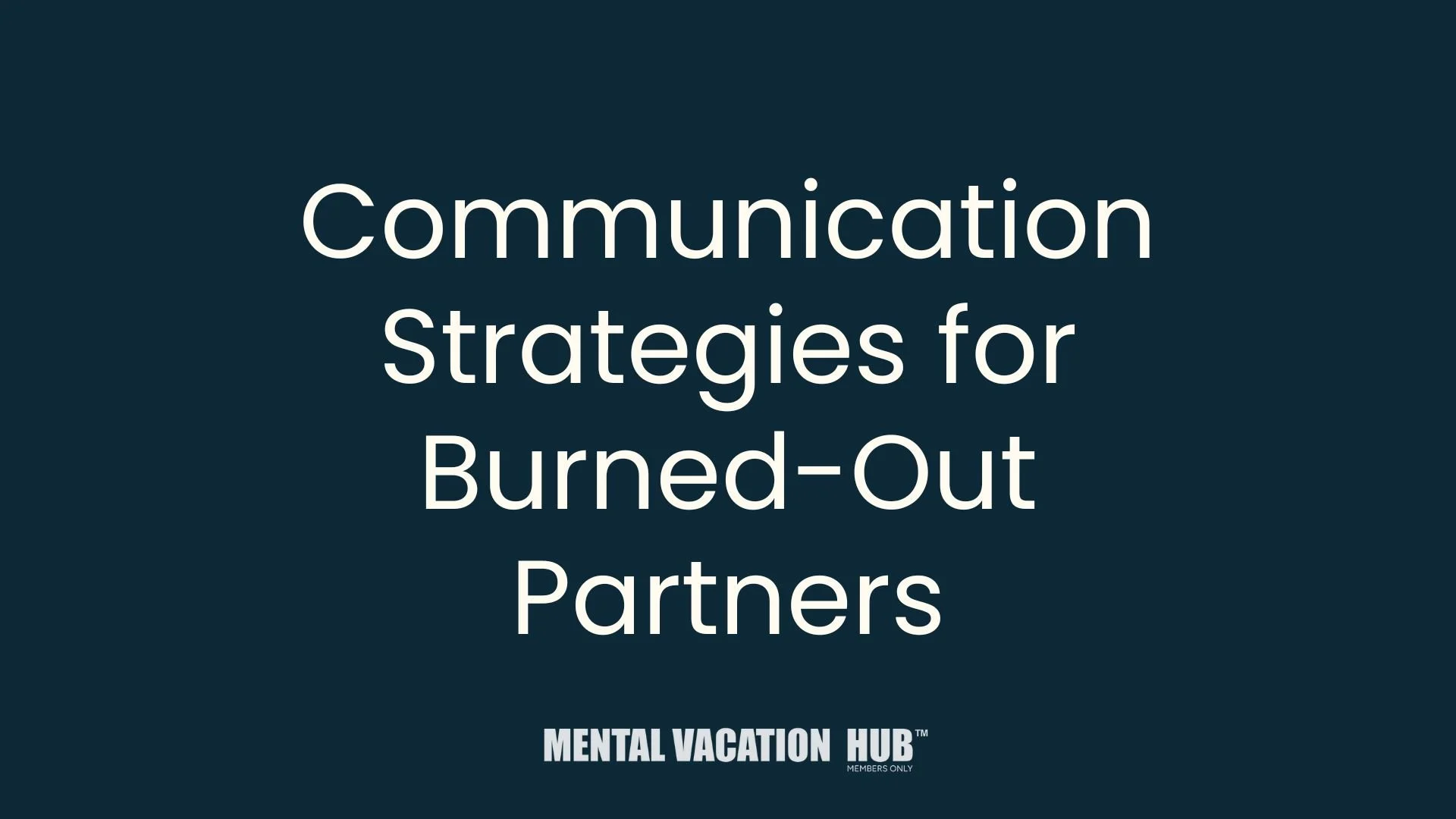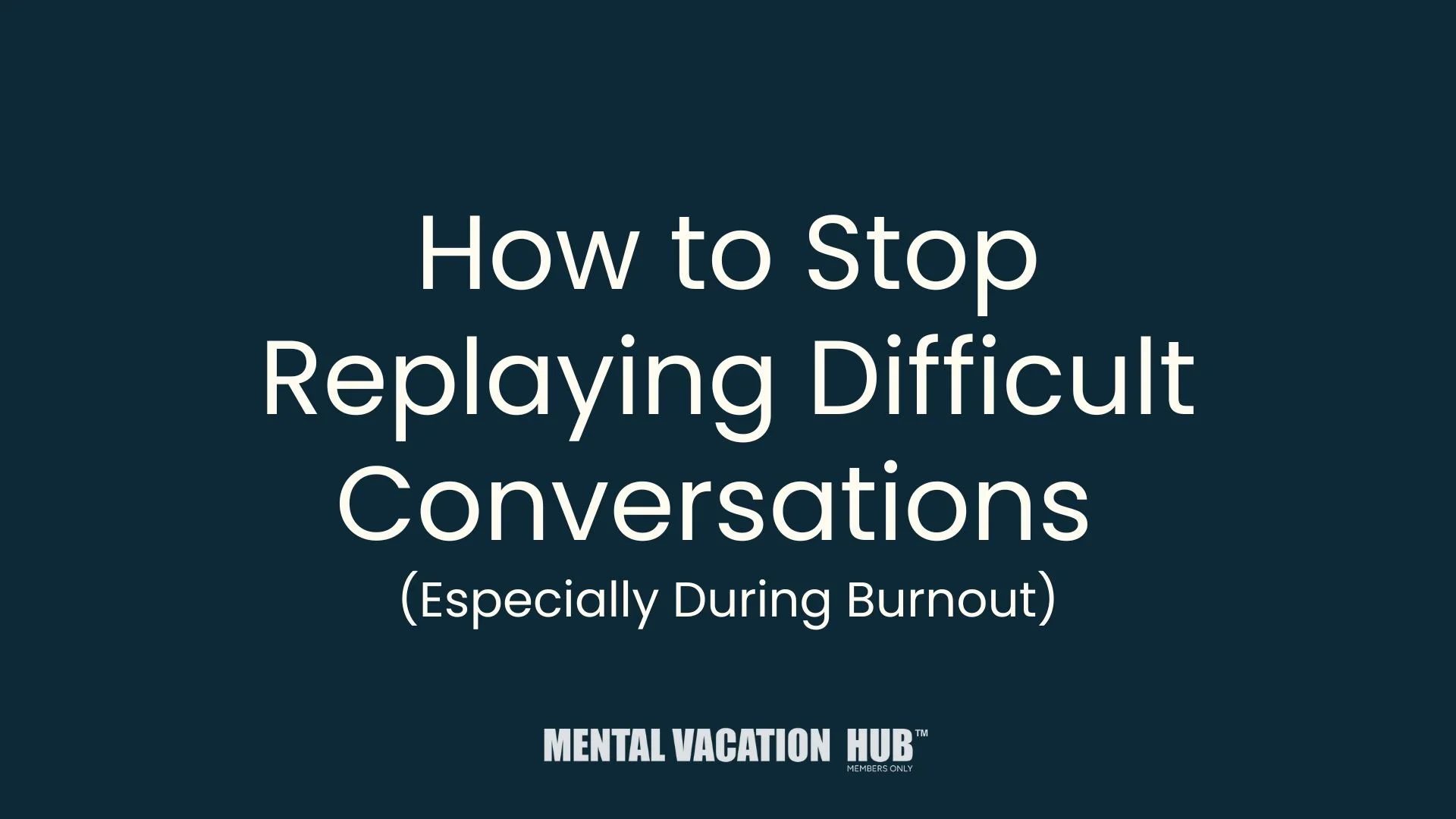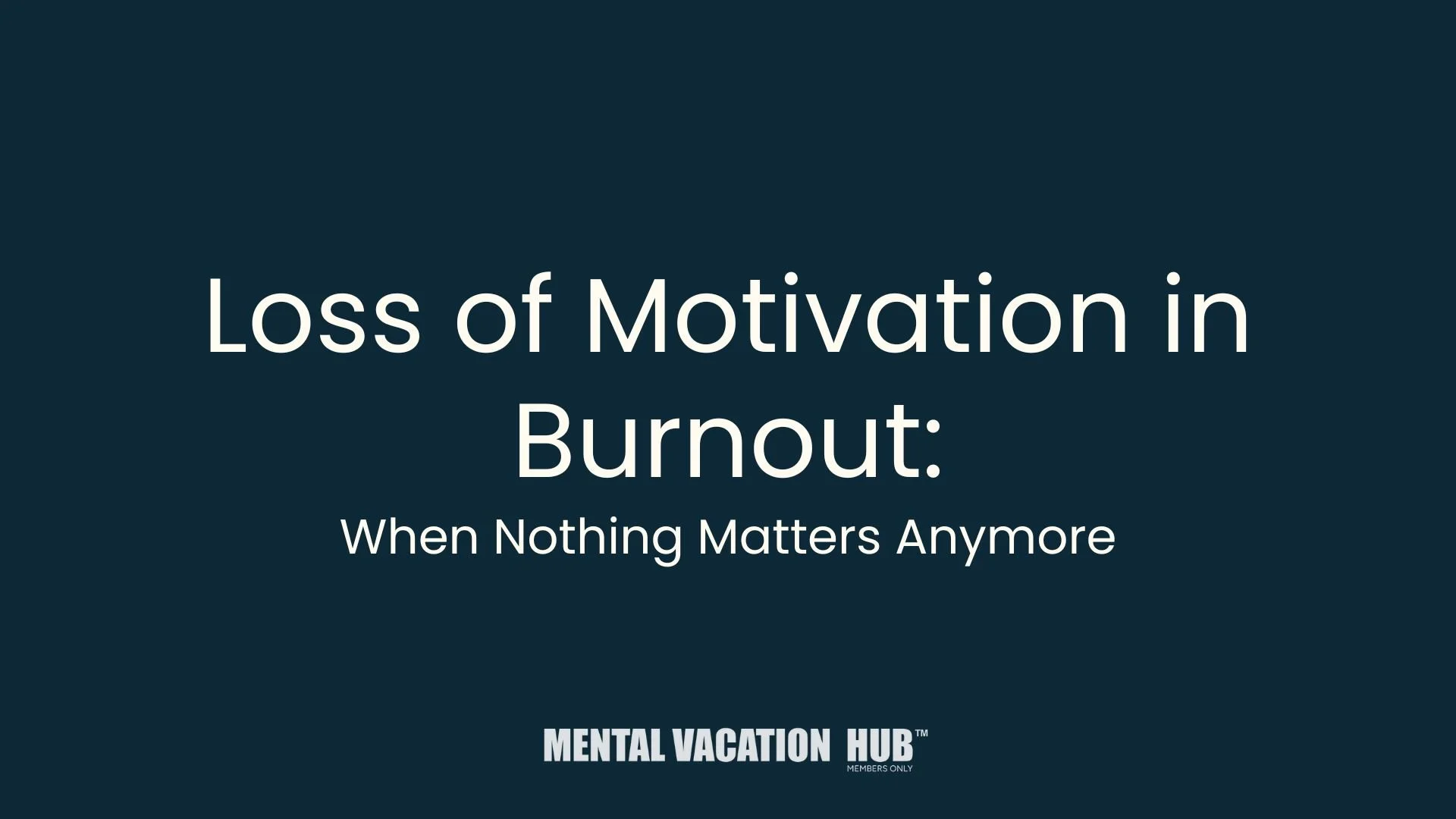Burnout and Conflicts: Why Everything Feels Like a Battle
Burnout often changes how you see and react to the world.
Small frustrations suddenly feel unbearable. You find yourself snapping at colleagues over minor issues or arguing with your partner about things that never mattered before. Every conversation feels like a battle to win or a threat to survive.
You may know you are overreacting, yet you cannot stop.
Your emotions take over. You say things you regret and damage relationships you value. You start asking yourself whether you have become a difficult person or whether everyone else has changed.
Neither is true.
Burnout disrupts your nervous system and traps your brain in constant threat mode. It makes you misinterpret neutral comments as criticism and harmless situations as danger. This reaction is not a sign of weakness or personality failure. It is a physiological response to exhaustion.
I experienced this during my own burnout.
I took offense easily and felt under attack most of the time. The more I snapped back, the more isolated I became. Once I learned that this was a symptom of burnout, I stopped blaming myself and began to rebuild my emotional regulation.
This article explains why burnout creates conflict, how emotional dysregulation damages relationships, and what you can do to reduce reactivity while recovering.
Why Burnout Creates Chronic Conflict
Nervous System Dysregulation
Burnout locks your nervous system in a state of fight or flight.
Your brain becomes hypersensitive to potential threats. Neutral situations begin to feel dangerous. You start hearing criticism in normal feedback and feeling attacked by routine questions.
This false threat perception fuels unnecessary conflict.
You are not imagining these feelings. Your body is sending real signals of danger even when none exist.
Burnout confuses your threat detection system and keeps you on high alert.
Emotional Depletion
Emotional regulation depends on cognitive energy.
When burnout drains your mental and physical reserves, that regulation disappears. You lose the ability to pause, reflect, or consider alternative perspectives. Every trigger feels urgent and personal.
Without emotional balance, your responses become automatic.
A small frustration provokes a large reaction. You may recognize your response is too strong, but you cannot stop it in the moment, because burnout removes the mental space that allows for choice.
Reduced Empathy and Perspective
Burnout also narrows your focus to survival.
When your system is in defense mode, empathy becomes secondary. You stop reading others accurately and interpret their actions through a negative lens.
Even neutral intentions can feel hostile.
This loss of empathy and perspective increases misunderstanding. You assume others mean harm when they do not.
As a result, conversations turn defensive and relationships become tense.
Chronic Irritability
Irritability is one of the clearest signs of burnout.
It is a physiological symptom. Your overstimulated nervous system cannot handle noise, interruptions, or even normal human behavior.
When every sound or request feels like an intrusion, irritation builds quickly. You react sharply and push people away.
Over time, this chronic irritability creates conflict at work and at home.
How Burnout-Driven Conflict Damages Relationships
Loss of Trust and Safety
Repeated conflict erodes trust.
People begin to walk on eggshells around you. They avoid sharing ideas or feedback because they fear triggering a reaction. Collaboration suffers. Relationships start to feel distant and transactional.
Once psychological safety disappears, even small disagreements feel impossible to resolve.
Burnout-driven conflict gradually destroys the foundation of trust that relationships depend on.
2. Isolation and Withdrawal
When you realize you are creating conflict, you may try to protect others by pulling away.
Distance seems safer than confrontation. Unfortunately, isolation only deepens burnout. When you withdraw, people interpret your silence as disinterest or rejection. They stop reaching out. You lose social support, which is one of the strongest protectors against burnout.
What began as self-protection becomes another source of pain.
3. Damaged Professional Reputation
In the workplace, burnout-driven reactivity can damage your reputation.
Colleagues may begin to view you as defensive or difficult. Your leadership presence declines, and people start to avoid collaboration.
Even after recovery, reputational damage can linger. It takes time and consistent behavior to rebuild professional credibility once others have seen you as reactive.
4. Strained Family Relationships
Home is often where burnout does the most harm.
You bring the stress home, and those closest to you absorb it. Partners and children experience your irritability and confusion without understanding the cause.
The emotional distance that develops can be painful and long-lasting.
Repairing family relationships after burnout requires open communication, patience, and time.
Recognize Your Burnout-Driven Conflict Patterns
Certain behavior patterns reveal when burnout, not personality, is driving conflict.
Overreactions to Minor Issues
You respond with intense emotion to something small.
A colleague asks a question, and you feel attacked. A partner makes a neutral comment, and you start an argument. The reaction does not match the situation.
This mismatch is a clear signal that emotional regulation has collapsed.
Difficulty Letting Go
After a disagreement, you cannot stop replaying the event.
You analyze what was said, defend yourself in your mind, and feel unable to move on. This mental loop keeps your nervous system stuck in threat mode.
Assuming Negative Intent
You interpret others’ silence or tone as disapproval.
You assume people mean harm or criticism without evidence. Burnout makes your brain biased toward danger, which turns normal interactions into perceived threats.
Frequent Conflicts Across All Areas
When you start noticing conflict everywhere—at work, at home, and in casual situations—the common factor is not your environment. It is burnout.
Recognizing this pattern is your first step toward recovery.
Regret After Conflict
After each argument, you feel ashamed or confused.
You know your reaction was excessive, yet it happened anyway. This regret shows that your values are intact, but your regulatory system is compromised.
How to Reduce Conflict During Burnout Recovery
Communicate Honestly
Let people know you are struggling with burnout.
Explain that your irritability and reactivity are symptoms of exhaustion, not reflections of your feelings toward them. Most people respond with understanding when they know what is happening.
Create Space Before Responding
When you feel triggered, pause before you speak.
Take a breath, count to ten, or step outside for a moment. This short space allows your nervous system to calm and gives you the chance to choose your response consciously.
Use “I” Statements
Express emotions with “I” statements instead of “you” accusations.
Say, “I feel overwhelmed right now,” instead of “You are too demanding.” This small shift reduces defensiveness and keeps communication open.
Set Clear Boundaries
Limit exposure to situations that overwhelm you.
Reduce meetings, decline optional social events, or block quiet time each day. Boundaries protect your remaining energy and reduce unnecessary conflict.
Apologize and Repair
When conflict happens, take responsibility quickly.
Acknowledge your reaction, explain the context briefly, and express your commitment to improvement. Early repair prevents long-term damage and rebuilds trust.
Seek Professional Support
Therapists and burnout coaches can help you rebuild emotional regulation.
Professional guidance provides structure, techniques, and accountability. Support also accelerates recovery and prevents relapse.
Long-Term Strategies for Preventing Conflict
Regulate Your Nervous System Daily
Nervous system recovery is the foundation of lasting emotional balance.
Practice regulation every day through breathwork, meditation, light exercise, or quiet time in nature. These routines shift your system from fight-or-flight to calm focus.
Consistency matters more than intensity. Even ten minutes of calm breathing or gentle stretching can lower baseline stress levels.
Over time, this daily regulation restores emotional stability and reduces reactivity.
Address Burnout at Its Root
Conflict is a symptom.
To prevent it, you must address the cause. Burnout recovery means real rest, reduced workload, and boundaries that protect your time and focus. Short breaks help, but full recovery requires sustainable change.
Once you treat the root cause, emotional regulation returns naturally.
You no longer need to manage every reaction because your system is no longer overwhelmed.
Rebuild Relationships Intentionally
When you start to feel more stable, take time to repair what burnout damaged.
Acknowledge the impact of your past behavior, express gratitude for patience, and listen to others’ experiences. Honest conversations rebuild trust faster than perfection.
People value sincerity over flawless behavior.
When you show humility and commitment, relationships recover.
Create Sustainable Stress Management
Design your life to prevent future burnout.
Build routines that maintain balance: scheduled downtime, realistic workload, and clear boundaries. Stress management is not a luxury. It is conflict prevention.
A sustainable system protects both your performance and your peace.
Frequently Asked Questions
Is my irritability during burnout permanent?
No. Irritability during burnout is temporary. It improves as your nervous system recovers. Most people feel calmer within three to six months of consistent rest and recovery practices. Full regulation often returns within a year.
How do I apologize without sounding defensive?
Take responsibility without overexplaining. Try saying, “I was short with you yesterday. That was not fair. I am dealing with burnout and working on managing my reactions. I am sorry for how I spoke.”
This shows accountability, not excuses.
What if someone does not forgive me?
Some relationships may not recover. Accept that outcome with grace. Focus on what you can control—your recovery, your growth, and your integrity. Healing yourself protects every future relationship.
Can burnout make calm people lose their temper?
Yes. Burnout changes brain function and emotional control. Even people known for calmness can become reactive. This is not permanent. Once you restore your energy and nervous system balance, your composure returns.
How can I talk about burnout with my team without seeming weak?
Be direct and professional. Say, “I am managing burnout and focusing on recovery. I may be quieter or need extra space, but I remain committed to our goals.”
Framing it as proactive health management builds respect and trust.
Conclusion
Burnout changes how your brain and body respond to stress.
It turns minor disagreements into full conflicts by keeping your nervous system in constant alert mode. The result is defensiveness, irritability, and strained relationships.
These reactions are not character flaws.
They are signs that your system is depleted and needs recovery. As you rest, set boundaries, and rebuild emotional regulation, your relationships begin to heal. Communication improves. Trust returns. Conflict fades.
Long-term recovery requires attention to both the body and the mind. Nervous system regulation, sustainable routines, and honest conversations create the foundation for lasting peace.
When you recover from burnout, you do not just regain calm.
You gain deeper self-awareness, empathy, and emotional strength that protect you from future collapse.
Learn More About Burnout
Ready to recover? Get Your Burnout SOS Handbook:

Burnout SOS Handbook: Practical steps to understand, survive, and recover from your burnout. Easy to follow - just right for a brain-fogged head. Start your healing today!
Take the Burnout Test
Our 5-minute Burnout Test cuts through the confusion and gives you a personalized snapshot of where you stand and what comes next.
Start the test →




